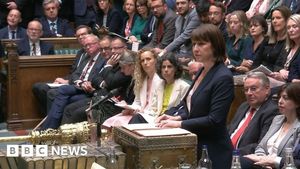The recent escalation between Israel and Hezbollah has led to significant developments on the ground, particularly with heavy rocket fire launched from Lebanon targeting northern Israel. The situation has prompted discussions among international players about potential ceasefire agreements.
On November 7, 2024, the Israel Defense Forces (IDF) reported over 120 rockets fired from Lebanese territory, primarily aimed at towns within the northern Galilee region. Specifically, from the afternoon hours, heavy bombardments ensued with alarms sounding off throughout the Haifa Bay area and western Galilee, creating panic among residents. While the IDF managed to intercept several of these rockets, reports indicated minor injuries, including one elderly person hurt by shrapnel.
Simultaneously, French Foreign Minister Barrot was engaged in diplomatic talks with Israeli officials. Their conversations centered around the security guarantees Israel would need for any prospective truce with Hezbollah. According to sources close to the discussions, there was optimism about reaching some agreement, which might lay the groundwork for more stability along the tense Lebanese-Israeli border.
Residents of northern Israel, meanwhile, are wrestling with the unpredictability of their security situation. Many are preparing for the possibility of returning home as military officials hinted at the final preparations for such moves. Yet, this has created anxiety among locals, with some families choosing to remain vigilant for any new outbreaks of violence.
Across the border, Lebanon is grappling with its own calamities. A recent Israeli strike south of Beirut reportedly killed twenty individuals, highlighting the grave and tragic human cost of this conflict. This has raised humanitarian concerns, with calls for more active international mediation to halt the conflict and provide aid to the affected populations.
The dynamics of the situation are compounded by the reactions of various factions within Lebanon. Hezbollah continues to assert its operational readiness, viewing itself as the staunch defender against Israeli aggression. Their rocket attacks are not only retaliatory but also serve to bolster their narrative within Lebanon and across the Arab world.
Meanwhile, Israeli Prime Minister Netanyahu is under pressure amid public outcry and political maneuvering. The dismissal of Defense Minister Gallant has been met with significant backlash from families of hostages held by militant groups. These families have filed petitions to the High Court, seeking to contest the legality of the dismissal, which they believe undermines military efficacy and their loved ones' safety.
Reasons cited for the legal challenge include concerns over operational continuity and leadership amid war conditions. The Attorney-General has weighed in, affirming the legality of the Prime Minister's decision, but it has done little to quell dissent from affected families and citizens who demand strong, focused governance.
Overall, the situation remains fluid and precarious. The potential for ceasefire negotiations hangs over the region, yet the daily realities of violence and disruption continue to affect the lives of countless civilians. With international stakeholders closely watching, the hope is for diplomatic engagements to lead to tangible peace agreements, allowing communities both sides of the border to regain some semblance of normalcy.
This conflict resonates far beyond its immediate geographic confines, entangling regional politics, defense strategies, and humanitarian crises. The global community remains on alert, as the mapping of this saga continues to evolve with each passing day, bringing fresh hopes and new challenges to those yearning for peace.



